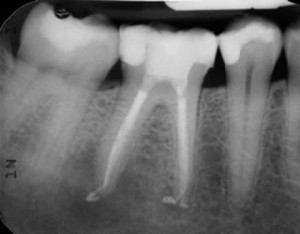Does Chewing Your Food Cause You Pain?
If putting pressure on your teeth causes significant discomfort, you may have a root canal infection
 Eating should be an enjoyable experience, but when the taste of your favourite food is spoiled by a severe pain when you bite down on it, you know that you have a problem.
Eating should be an enjoyable experience, but when the taste of your favourite food is spoiled by a severe pain when you bite down on it, you know that you have a problem.
Whilst we might often assume that this means we have tooth decay and that a straightforward filling should be all that we need, a symptom such as this could mean that you have an infection in the root canals of your teeth, a problem that will require a more complex treatment at our Ipswich dental clinic.
Root canal infections occur following damage or major wear to the enamel on our teeth. This allows bacteria to enter into the more porous dentin part of the tooth. In many cases, discomfort will be noticeable at this stage, often in the form of a toothache, and usually patients will then visit the Foxhall Dental Practice to have this checked and treated.
Where this initial discomfort isn’t felt, or where patients choose to ignore these early warning signs, the bacteria may then enter into the root canals of the tooth, causing an infection that can lead to severe pain.
Treating a root canal infection
When the root canals of a tooth become infected, the tooth can not be restored using the normal filling method. In order to access the root canals, your dentist will first of all provide you with a local anaesthetic to minimise any discomfort that the procedure might cause (more on that later). They will then need to access the top section of the tooth so that the root canals can be reached. Once this has been done, the infected material can then be removed and the hollow canals thoroughly cleaned to remove any remaining bacteria.
Once cleaned, the root canals then need to be filled. Usually, fillings are carried out using either an amalgam filling or one of the increasingly popular tooth coloured fillings that we offer our Ipswich patients. In the case of a root canal procedure though, a special type of filling called ‘gutta percha’ is used. Gutta percha is a thermoplastic substance that comes from the percha tree, most commonly found in Malaysia. This material is used as it can be heated and then compressed into the root canals. This provides an excellent sealant that minimises the risk of any reinfection following the procedure. Finally, in most instances, the dentist will apply a crown to complete the restoration. This has the advantage of providing additional strength to the restored tooth as well as making it look natural again.
A ‘dead’ tooth
Once the tooth has been restored, it is important to remember that it will have no sensation at all. This is due to the nerves being removed, along with the other infected pulp material, as they are stored in the root canals. This means that you will need to be careful when eating, that you don’t bite down on anything too hard with the tooth as you won’t be able to judge the pressure you are applying. Although a root canal treated tooth is relatively strong, it will not be as strong as a healthy tooth and caution should be applied when using that tooth, otherwise it could fracture.
Does the procedure hurt?
This is the question that we are most frequently asked about this procedure. This is hardly surprising given the bad ‘rap’ that it has had, often being used to signal the most severe pain possible. The good news for anyone needing this treatment is that you really shouldn’t experience any more discomfort than you would expect from other invasive dental procedures.
The anaesthetics that are currently used are very powerful and minimise any risk of you feeling pain. You may feel some sensations that concern you during the treatment, and it may feel like pain is imminent, but the anaesthetics prevent this from happening. Our experienced team has performed this procedure too many times to mention and you can be sure that we will make the treatment as comfortable as we can for you.
Tooth maintenance after treatment
Some people may come to the conclusion that as the roots of the tooth have been removed, there is no need to brush that tooth as they won’t be able to get a toothache. The reality is that whilst this is true, you do still need to brush the tooth and floss around it. Like all of your other teeth, there is still a real risk of gum disease if you don’t, and this could mean that you eventually lose the tooth. Keeping a root canal treated tooth clean requires no additional cleaning to a healthy tooth and is something that you should be doing anyway.
If you experience a toothache, whether it feels relatively minor or is very painful, you should contact the Foxhall Dental Practice straight away so that we can arrange a prompt appointment for you. Not only will this mean that you don’t have to be in discomfort for as long, but also treating a tooth early usually means that the tooth can be saved or that a less extensive treatment will be needed.
For all toothaches and any other dental problems, please make an appointment by calling our Ipswich practice on 01473 258396.
